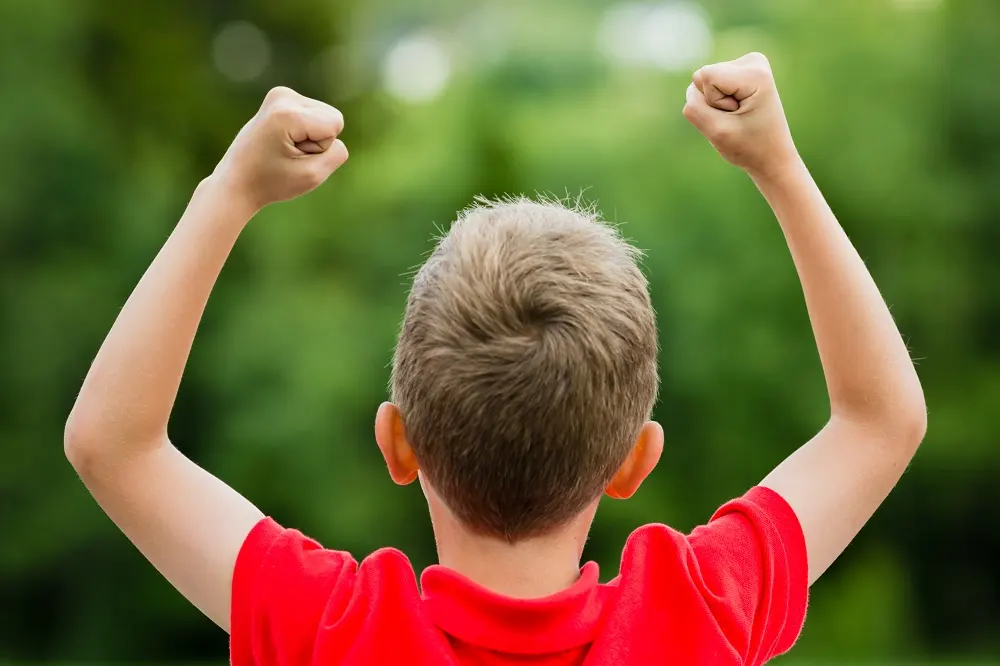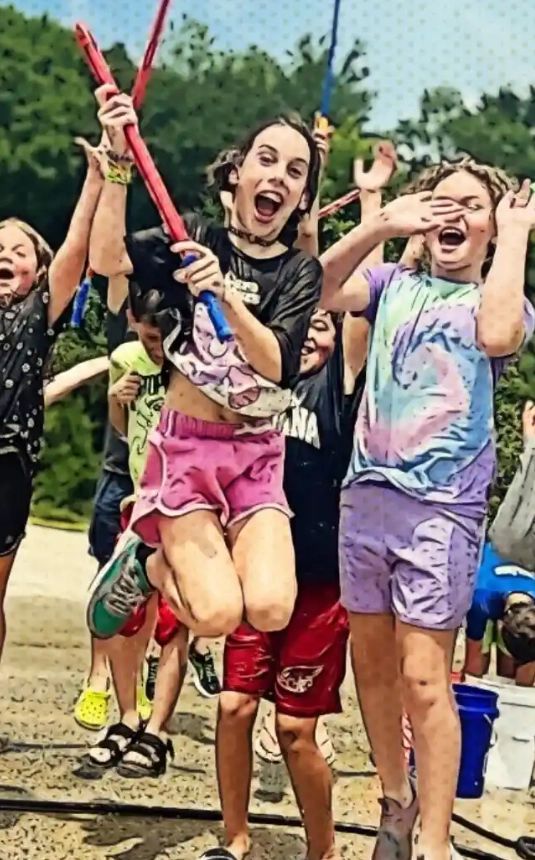When your child comes home saying, “I’m not good at anything”, there’s nothing more heartbreaking. Self-esteem comes from learning self-acceptance by seeing our challenges and still choosing to like ourselves. Research shows that every child’s self-esteem grows with each experience of successful interactions through positive thinking and encouragement.
At Mission Grit, we witness incredible transformations: kids who arrive feeling uncertain leave our obstacle courses beaming with pride. It’s a rewarding experience for everyone! This article explores eight engaging self-esteem activities for kids designed to foster confidence and resilience, sharing practical strategies that empower children to thrive.
Signs Your Child May Be Struggling with Low Self-Esteem
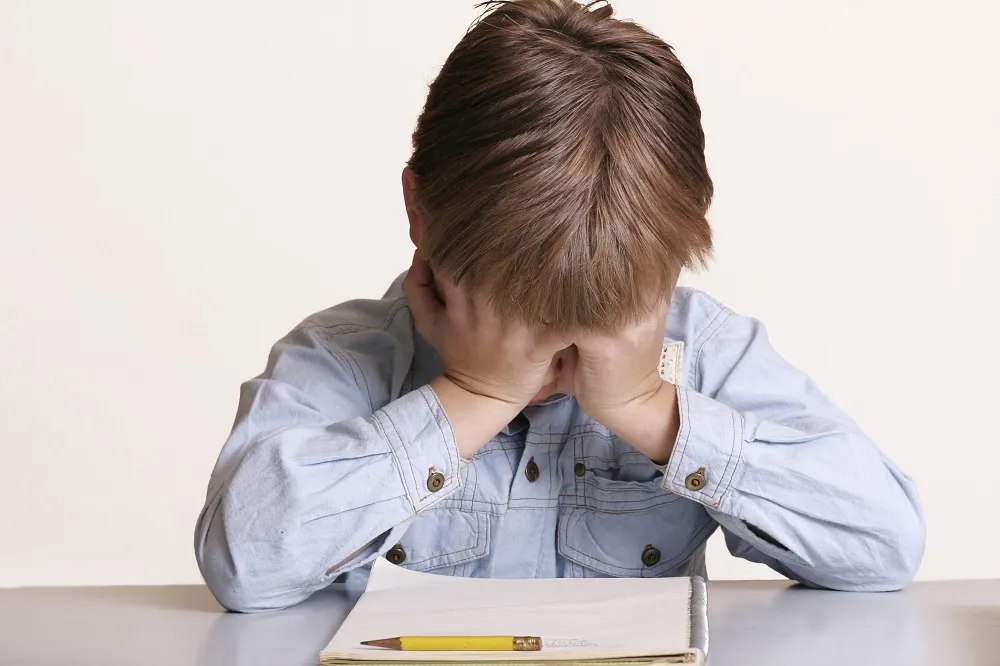
The sooner you identify signs of low self-esteem in your child, the sooner you can take action to help them develop confidence and emotional well-being. When we recognize these signs, we can take proactive steps to support our children’s mental health and personal growth.
Here are some common indicators of self-esteem issues in children:
- Fear of new challenges: Children who show self-doubt avoid trying new activities or give up quickly when faced with difficulties, often saying “I can’t do this” before even attempting the task.
- Negative self-talk: Children often internalize mistakes as personal failures. Our instructors teach kids to reframe their thoughts into growth moments.
- Difficulty accepting compliments: When praised, these children often dismiss positive feedback or seem uncomfortable receiving recognition for their achievements.
- Emotional sensitivity: Many children with low self-esteem struggle with coping skills and may become overwhelmed by difficult feelings or criticism.
- Social withdrawal: Children who lack confidence may isolate themselves from peers, avoid team sports or group activities, and struggle to form meaningful friendships due to feelings of inadequacy.
Once you recognize these patterns, you can create supportive environments where children can build self-confidence through positive experiences. When we give children the chance to push their boundaries — physically, mentally, and emotionally — we help build the strong foundation they need for healthy self-esteem.
Essential Child Self-Esteem Activities That Foster Confidence
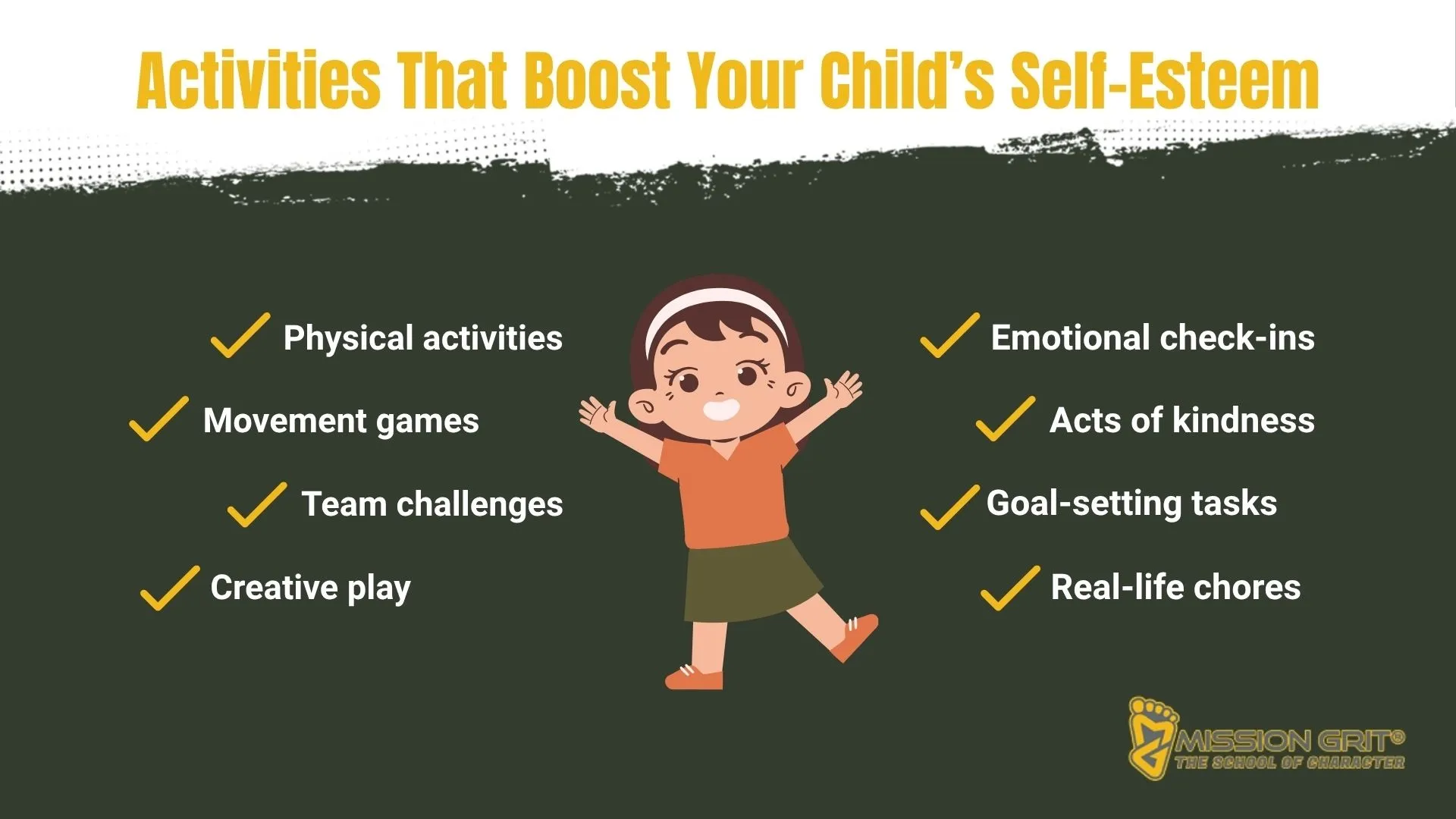
When it comes to nurturing your child’s self-esteem, engaging them in the best self-esteem activities is key. Let’s explore a range of activities that can empower your child to embrace challenges and celebrate their individuality!
1. Physical Challenge Activities
Physical activities boost confidence by helping kids build resilience and perform better academically. Overcoming challenges shows them their bodies and minds are capable, laying the groundwork for higher self-esteem.
Here are some fantastic ideas to get started:
- Obstacle course adventures: Create obstacle courses using household items like pillows, chairs, and jump ropes. This combines problem-solving with physical movement, building confidence through achievement.
- Dancing: Put on some music and let them dance! Dancing is not only fun but also helps them develop coordination, rhythm, and a positive body image.
- Outdoor play: Encourage outdoor play with activities like running, jumping, climbing, and playing tag. These activities promote physical development, social interaction, and love for nature.
- Sports: Participating in team sports or individual activities like swimming, martial arts, or gymnastics can improve physical health and self-esteem.
When children experience the satisfaction of physical accomplishment, they develop a growth mindset that extends far beyond the activity itself. They learn that persistence and effort lead to improvement, building the foundation for positive self-esteem that will serve them throughout life.
2. Movement and Coordination Activities
Movement activities build physical confidence and mental resilience. As children improve coordination and master new skills, they start to trust their bodies. This physical growth supports emotional well-being, especially in a fun, supportive space.
Exciting movement activities include:
- Parkour-inspired movement: Teach safe jumping, balancing, and climbing techniques that help children feel capable and strong. These activities build both physical skills and mental confidence.
- Balance challenges: Use balance beams, stepping stones, or even tape lines on the floor to create fun coordination challenges that improve focus and body awareness.
- Jump and tag circuits: Fast-paced games that boost coordination, build stamina, and spark confidence through fun, active play.
- “Freeze & Think” movement games: Kids move, freeze, then solve a quick task — blending motion with focus and emotional control.
3. Team-Building Activities
Team-building activities are powerful tools for developing social skills and boosting self-esteem. As children work toward shared goals, they learn to value their role, appreciate others’ strengths, and build the confidence they need to form lasting, healthy relationships.
- Group games: Simple group games, such as “Duck, Duck, Goose” or “Red Rover”, teach children about following rules, taking turns, and interacting with others.
- Conflict resolution practice: Teach children how to navigate disagreements respectfully through role-playing and guided discussions about feelings and solutions.
- Collaborative problem-solving: Challenge groups to solve puzzles together or build structures using blocks or other materials, encouraging communication and teamwork.
4. Creative and Problem-Solving Activities
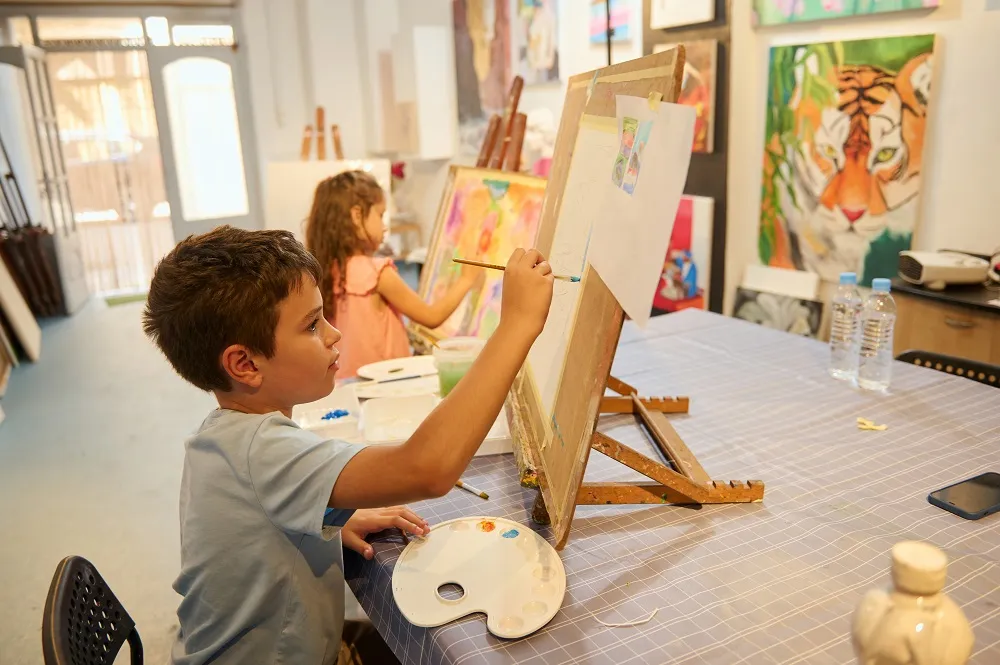
Creativity and problem-solving build strong confidence in children. When kids bring ideas to life or solve challenges, they feel empowered. These moments boost critical thinking, encourage a positive self-image, and inspire innovative thinking.
Here are a few ideas:
- Drawing and painting: Let them unleash their inner artist with colorful crayons, paints, and a blank canvas. Encourage them to draw whatever comes to mind.
- Building with blocks: Building towers, castles, or anything their imagination conjures up is an excellent way to boost their spatial reasoning skills and problem-solving abilities, all while having a blast!
- Storytelling: Encourage them to create their own stories. They can act them out, draw pictures to accompany their tales, or even write them down if they’re ready.
- Puzzles: Puzzles help develop problem-solving skills, spatial reasoning, and fine motor skills. Start with simple puzzles and gradually increase the difficulty as their confidence grows.
When children struggle, focus on their effort and creativity, not the outcome. This nurtures a growth mindset and shows that learning and progress matter more than perfection.
5. Personal Development and Emotional Regulation Activities
Helping children develop emotional awareness and manage their emotions builds lasting inner strength. With emotional intelligence and self-awareness, they face life’s ups and downs confidently, forming the foundation for mental health and strong relationships.
Here are some activities to consider:
- Feelings chart: Help them understand and express their emotions. Create a feelings chart with different facial expressions representing various emotions. Encourage them to identify their emotions throughout the day.
- Positive affirmations: Introduce positive affirmations and encourage your child to repeat them aloud. These affirmations can be simple statements like “I am kind”, “I am brave”, or “I am loved”.
- Breathing exercises: Teach them simple breathing exercises, like taking slow, deep breaths. This practice helps calm their nerves and promotes relaxation.
- Quiet time: Encourage them to have some quiet time each day, even if it’s just for a few minutes. During this time, they can read, draw, or simply relax.
6. Respect and Character Building Activities

Character-building activities help kids develop values and positive qualities that strengthen self-esteem. Practicing kindness, gratitude, and respect fosters a strong sense of identity and shows them they can positively impact the world.
- Gratitude practices: Start a daily family journal where kids draw or list three gratitudes. This helps shift focus from what’s missing to what’s meaningful.
- Kindness challenges: Encourage kids to perform random acts of kindness, like helping a classmate or surprising a family member at home. These build self-worth through giving.
- Compliment circles: Share genuine compliments during family time. This helps children see strengths in themselves and others while improving social confidence.
7. Achievement and Goal-Setting Activities
Goal-setting activities are powerful tools for building self-esteem, giving children a straightforward way to track progress and celebrate growth. As kids set and reach their goals, they learn that effort leads to results — a lesson that builds lasting confidence and helps develop leadership skills.
- SMART goal adventures: Guide kids to set Specific, Measurable, Achievable, Relevant, and Time-bound goals. For example: “I’ll do five push-ups in two weeks by practicing daily”.
- Progress journals: Let kids track their improvement in favorite activities like reading, learning new skills, or mastering fun physical challenges.
- Vision boards: Use pictures, drawings, and words to display goals and dreams. These visual boards boost motivation and excitement for personal growth.
- Celebration rituals: Create special ways to honor wins, big or small — like high-fives, treats, or sharing successes with friends and family.
Success secret: Focus on effort and growth, not comparisons. When kids see progress as personal and unique, they build lasting confidence that doesn’t rely on being “the best”.
8. Practical Life Activities
Practical life skills build confidence by showing kids their efforts matter. Helping with real tasks gives them a sense of value, competence, and responsibility, reinforcing that they’re capable and important members of their families and communities.
Here are some examples:
- Setting the table: Let them help set the table for meals. They can count out the plates, napkins, and utensils, developing their counting skills and sense of responsibility.
- Helping with chores: Assign them simple chores like putting away their toys, folding laundry, or watering plants. These tasks teach them the importance of contributing to the household.
- Organization projects: Let kids organize their rooms, schoolwork, or photos how they choose. These tasks build executive function and a strong sense of accomplishment.
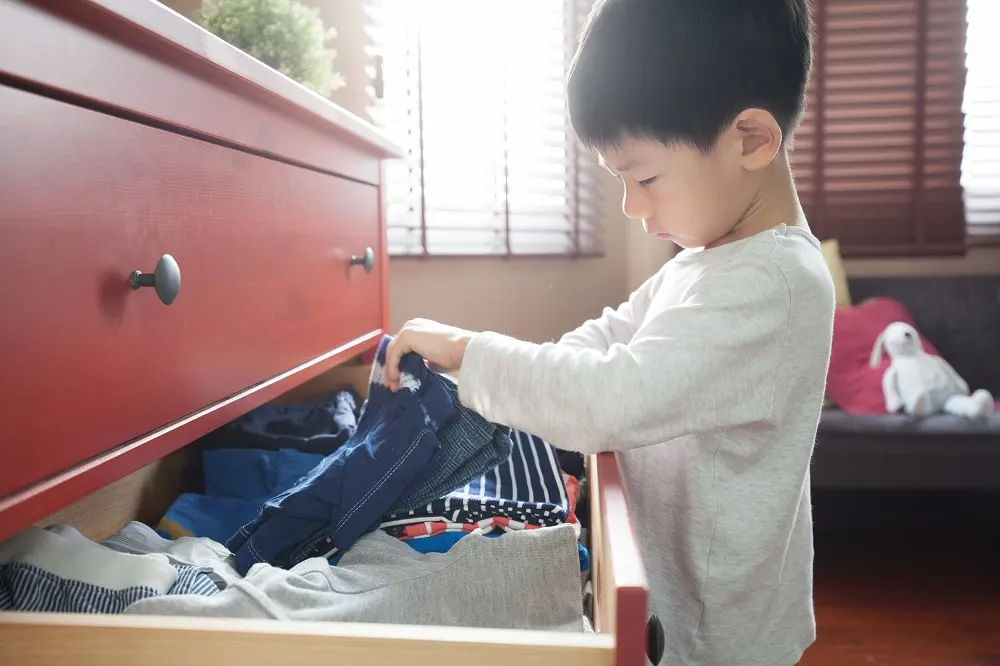
Building Your Child’s Self-Esteem: Essential Strategies for Success
Now that you understand these powerful self-esteem activities for kids, it’s important to know how to implement them effectively. How we approach these activities plays a crucial role and can make the difference between building genuine confidence and creating pressure that undermines self-esteem.
- Create a supportive environment: Children thrive when they feel loved for who they are. Celebrate their strengths and provide safe spaces for mistakes and growth.
- Focus on effort over outcomes: Praise persistence, creativity, and problem-solving, not just results. This builds a growth mindset and teaches that abilities grow with practice.
- Encourage healthy risk-taking: Celebrate when kids try new things and step outside their comfort zones. Facing challenges helps them build true, lasting confidence.
- Teach emotional intelligence: Help children recognize and express feelings. Give them coping tools for tough emotions like frustration, disappointment, and anxiety.
- Model positive self-talk: Kids learn more from what they see than hear. Show how to speak kindly to yourself and grow from mistakes.
- Provide positive reinforcement: Give genuine praise for effort and growth. Avoid empty compliments and help kids feel truly seen and appreciated.
The goal is to help children develop an internal sense of worth that doesn’t depend on external validation. When children learn to value themselves for their character, effort, and growth, they build the resilient self-esteem that will serve them throughout their lives.
Build Your Child’s Confidence with Mission Grit
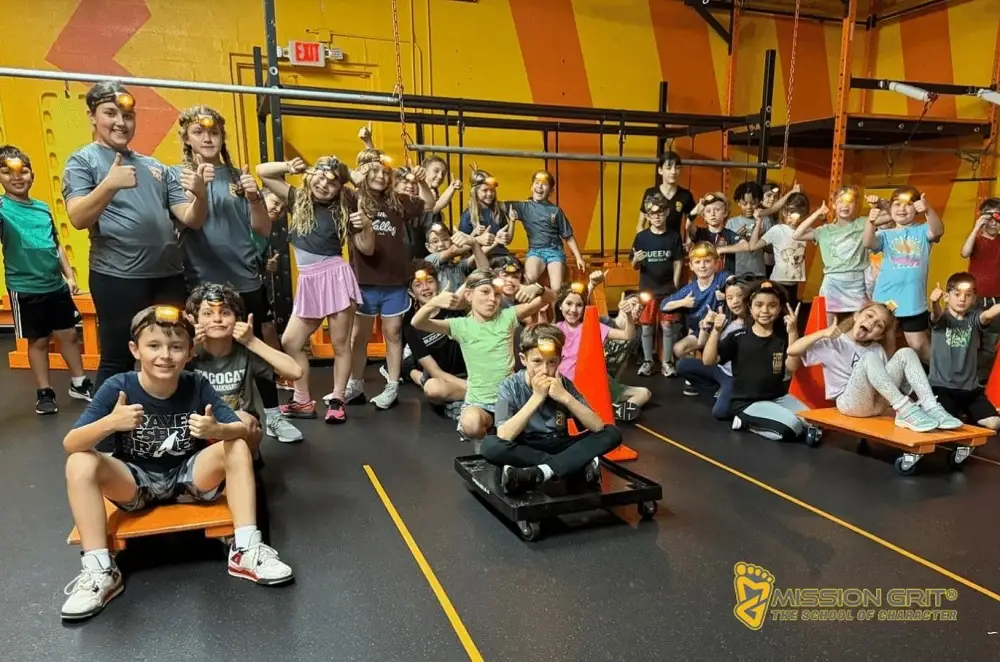
Building strong self-esteem sets the stage for a child’s future success. These activities help foster confidence, resilience, and a positive sense of self, one small win at a time.
At Mission Grit, we’re passionate about helping Charlotte families discover the transformative power of confidence-building activities. Our Xplor™ program combines obstacle courses with character development. The unique S.P.I.R.I.T. method creates the perfect environment for self-esteem-building activities for kids:
- Science: Obstacle challenges use physics and engineering to boost thinking and confidence.
- Problem-solving: Each course builds creativity and persistence for real-life success.
- In motion: High-energy movement and music build confidence and lift mood.
- Respect: Kids practice discipline, kindness, and accountability to grow self-worth.
- Interactive: Hands-on tasks and feedback help kids grow at their own pace.
- Teamwork: Group challenges build communication, support, and shared success.
This comprehensive method creates lasting changes in how children see themselves and their capabilities. Contact us today to learn how we can support your child’s confidence journey!

